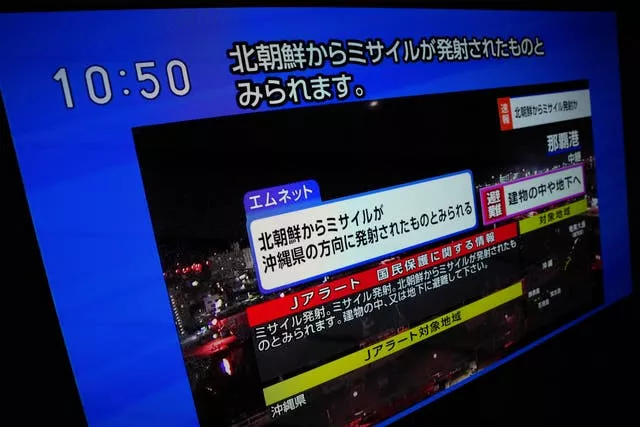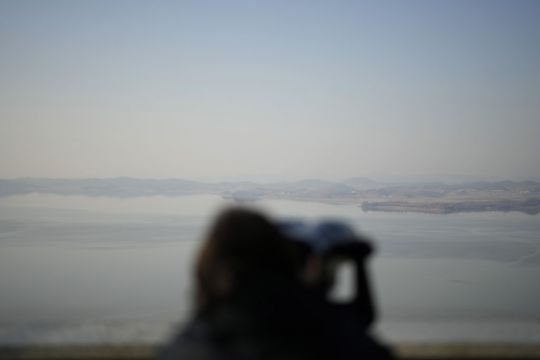North Korea claimed Wednesday to have successfully placed a spy satellite into orbit with its third launch attempt this year, demonstrating the nation’s determination to build a space-based surveillance system during protracted tensions with the United States.
The North’s claim could not immediately independently be confirmed and observers doubt whether the satellite is advanced enough to perform military reconnaissance.
Nevertheless, the launch still invited strong condemnation from the United States and its partners because the UN bans North Korea from conducting satellite launches, calling them covers for tests of missile technology.

The North’s space agency said that its new “Chollima-1” carrier rocket accurately placed the Malligyong-1 satellite into orbit on Tuesday night, about 12 minutes after lift-off from the country’s main launch centre.
The National Aerospace Technology Administration called the launch a legitimate right of North Korea to bolster its self-defence capabilities. It said the spy satellite would help improve the North’s war preparedness in the face of “the enemies’ dangerous military moves”.
The agency said leader Kim Jong Un oversaw the launch at the scene and congratulated scientists and others involved.
It said North Korea will launch several more spy satellites to better monitor South Korea and other areas.
US National Security Council spokesperson Adrienne Watson said Washington strongly condemned North Korea for the launch, saying it “raises tensions and risks destabilising the security situation in the region and beyond”.
She said the launch involved technologies that are directly related to North Korea’s intercontinental ballistic missile program.

South Korea’s military said it will maintain readiness to repel any provocations by North Korea based on an alliance with the United States.
Japanese Prime Minister Fumio Kishida called the launch “a serious threat that affects the safety of the people” and said Japan lodged a protest with North Korea condemning the launch in strongest terms.
A spy satellite is among the key military assets coveted by North Korean leader Kim Jong Un, who wants to modernise his weapons systems to cope with what he calls escalating US threats.
North Korea attempted to launch a spy satellite twice earlier this year but both launches ended in failure due to technical issues.
The country had vowed a third launch would take place some time in October but did not follow through with that plan.
South Korean officials have said the delay occurred likely because North Korea was receiving Russian technological assistance.
North Korea and Russia, both US adversaries that are increasingly isolated globally, have been pushing hard to expand their relationships in recent months.
In September, Mr Kim travelled to Russia’s Far East to meet President Vladimir Putin and visit key military sites, touching off intense speculation of a weapons deal between the two nations.

The alleged deal involves North Korea supplying conventional arms to refill Russia’s ammunition stock drained in its war with Ukraine.
In return, foreign governments and experts say that North Korea seeks Russian help in enhancing its nuclear and other military programmes. During Mr Kim’s Russia visit, Mr Putin told state media that his country would help North Korea build satellites, saying Mr Kim “shows keen interest in rocket technology”.
Both Russia and North Korea dismissed outside accusations of their alleged arms transfer deal as groundless. Such a deal would violate UN Security Council resolutions that prohibit any weapons trading involving North Korea.
The White House said in October that North Korea had delivered more than 1,000 containers of military equipment and munitions to Russia. But South Korean defence minister Shin Wonsik said in a media interview this week that North Korea had sent about 3,000 containers to Russia.
Mr Kim previously said North Korea needed spy satellites to better monitor South Korean and US activities and enhance the effective use of its nuclear missiles. But South Korea has said a North Korean spy launch programme also involves efforts to manufacture more powerful intercontinental ballistic missiles.
“If North Korea succeeds in launching the military reconnaissance satellite, it would signify that North Korea’s ICBM capabilities have been taken to a higher level,” South Korean President Yoon Suk Yeol said in responses to questions from The Associated Press earlier in November. “Therefore, we will have to come up with reinforced countermeasures.”







